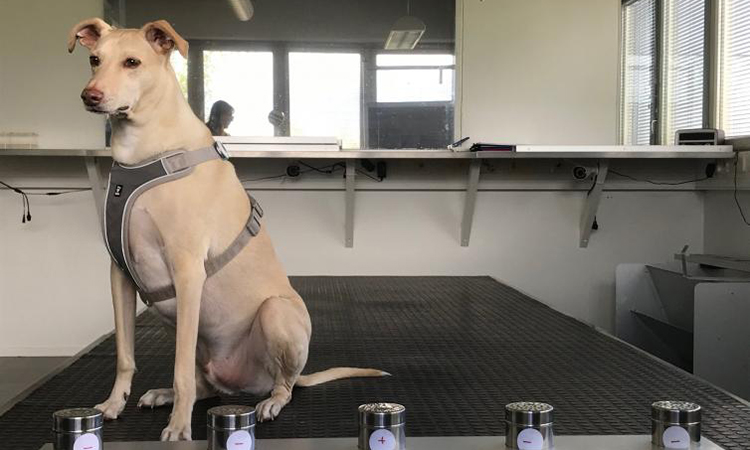COVID-19 dogs introduced at Helsinki to identify infected passengers
Posted: 21 September 2020 | International Airport Review | 1 comment
A total of 16 COVID-19 dogs will be operating at Helsinki Airport, working to identify passengers who are infected with the virus.


Credit: Finavia
COVID-19 dogs are set to soon begin working at Helsinki Airport (HEL). The dogs’ sensitive noses are expected to speed up the process of identifying those infected with the COVID-19 virus. The city of Vantaa believes that the dogs will be an efficient method of ensuring health and safety at airports.
Director of Helsinki Airport, Ulla Lettijeff, from Finavia, said: “The pilot that will be kicked off on 22 September 2020 is unique and a world first. No other airport has attempted to use canine scent detection on such a large scale against COVID-19. We are pleased with the city of Vantaa’s initiative. This might be an additional step forward on the way to beating COVID-19.”
Detecting COVID-19 is easy for dogs and results have been encouraging. According to preliminary tests conducted by a research group at the Veterinary Faculty of the University of Helsinki, dogs are able to smell the virus with almost 100 per cent certainty. They can also identify the virus days before the symptoms have even started. This is something that laboratory tests fail to do.
Join us live: Shaping the Next Generation of Hold Baggage and Air Cargo Screening
Join us live for an insightful webinar on 11th December at 14:00 GMT, in collaboration with Smiths Detection, as we explore the strategic balance of operational efficiency, regulatory compliance, and sustainability in high-volume security environments.
This session offers a focused look into future-proofing your security strategy.
Key learning points
- Cost Reduction: Strategies to minimize bag travel time while simultaneously reducing operational costs.
- Regulatory Roadmap: Insights into the next wave of regulatory changes and their impact on future investment decisions.
- Sustainable Systems: Practical approaches to building sustainability into security systems and lowering the total cost of ownership (TCO).
- Scalable Solutions: Real-world examples of scalable systems supporting current airport growth and preparing for tomorrow.
Register now for expert insights, case studies, and actionable strategies on operational efficiency!
Dogs are also able to identify COVID-19 from a much smaller sample than the PCR tests used by health care professionals. The difference is massive, as a dog only needs 10-100 molecules to identify the virus, whereas test equipment requires 18,000,000.
The Helsinki Airport COVID-19 dogs are trained by Wise Nose. Nose Academy, the research group’s start-up company, is running the operation at the airport. In the future, customs dogs might replace the current operatives. Official COVID-19 testing with trained dogs can only begin once a corresponding legislative amendment has been passed.
Taking a COVID-19 dog test at Helsinki Airport will not include direct contact with the dog. Instead, the dog will perform its work in a separate booth. Those taking the test will swipe their skin with a test wipe and drop it into a cup, which is then given to the dog. This also protects the dog’s handler from infections. All the tests are processed anonymously. If the test result is positive, the passenger will be directed to a health information point maintained by the city of Vantaa, which is located at the airport.
In the future, four dogs will work at the airport during a shift. The duration of each shift depends on the dogs. A total of 16 are being trained for the job. Almost all of the dogs have done scent detection before. How long it takes to learn to identify COVID-19 depends on the dog’s background. One of the dogs that will soon work at Helsinki Airport is an eight-year-old greyhound mix called Kössi, who learned to identify the scent in just seven minutes.
Join our free webinar: Revolutionising India’s travel experience through the Digi Yatra biometric programme.
Air travel is booming, and airports worldwide need to move passengers faster and more efficiently. Join the Digi Yatra Foundation and IDEMIA to discover how this groundbreaking initiative has already enabled over 60 million seamless domestic journeys using biometric identity management.
Date: 16 Dec | Time: 09:00 GMT
rEGISTER NOW TO SECURE YOUR SPOT
Can’t attend live? No worries – register to receive the recording post-event.
Related topics
COVID-19, Passenger experience and seamless travel, Safety, Terminal operations



















Does wise nose have any collaborators or offices in the USA? has the us CDC had any involvement in this area of investigation?
thanks
Matthew Salon MD
Munson Medical CenterTraverse City, Michigan, USA